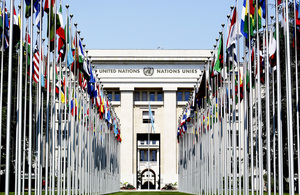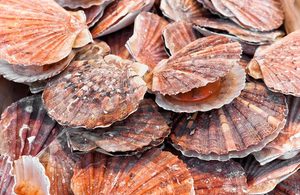Addressing underlying factors of instability in the Sahel
Thank you, Mr President, and we’re grateful, as ever, to Mr Chambas for his report on the situation and for UNOWAS activity during the first six months of its new three year mandate.
It’s clear from his report that COVID-19 has added a further layer of complexity to an already difficult situation. And the UK appreciates, Mr Chambas, that you are having to adjust in the face of this new dynamic.
I am also very grateful to Ms Ibrahim for transposing the analysis we read in the reports into a real human story. She brought into stark relief the challenges of climate change for societies in the region and the need for good governance with development and security. And as she put it, for a green deal – issues that we the UK care about as the forthcoming hosts of COP26 and the ‘rebuilding better’ strand of our FFD work.
Now, we know, Mr President, that the confluence of negative factors in the Sahel presents a unique and complex challenge. Chronic underdevelopment, extreme poverty, marginalisation, insecurity and governance vacuums easily filled by malevolent actors and competition over resources exacerbated by climate change, again, as Ms Ibrahim said.
The COVID-19 pandemic risks exacerbating these issues, but it did not create them. And it remains critical that we sustain efforts to address the underlying drivers of poverty and instability in the region.
Mr President, the UK is deeply troubled by the deteriorating humanitarian situation outlined by SRSG Chambas. With over 15 million people in need of humanitarian assistance and over 3 million people displaced in the Sahel alone, it is critical that our response is able to reach those most in need. In this context, we urge all parties to ensure unhindered humanitarian access and movement to allow the delivery of essential goods and services. Without this, food insecurity and protection needs will continue to rise. This is particularly the case for women and girls who are facing increased exposure to gender-based violence and other human rights abuses.
The UK shares others’ concerns about the deteriorating security situation, particularly in Mali and in Burkina Faso. We call on all parties to respect human rights and international humanitarian law. In this respect we should be mindful of the tragic consequences of violations, both on a human level and as a driver of further violence. And we call on all the G5 Sahel governments to undertake fair and transparent investigations of alleged violations by state security forces and to hold those responsible to account.
The rise in extremist and terrorist violence in the Lake Chad basin is also deeply troubling, including the recent targeting of a UN humanitarian facility. Such attacks threaten to increase displacement and the number of people in IDP camps still further.
With presidential elections fast approaching in a number of countries, it has never been more important to prioritise prevention and preserve stability. The UK is particularly alarmed by violence in Guinea in recent months and the prospect of seeing more as we approach those elections. Preventing backsliding on governance, accountability, access to justice and human rights is critical to ensure environments conducive to free, fair, timely and credible elections.
So it’s our sincere hope, Mr President, that 2020 will be, as Mr Chambas said, defined by democratic consolidation, by credible, inclusive and peaceful elections, and where those who are required by those elections to leave power ensure a smooth transition of power.
Returning to the global coronavirus pandemic, the UK is clear-eyed about the challenges faced by vulnerable countries across West Africa and the Sahel, and it’s working hard to support those most in need. We’re committed to a global response. And last month, the UK hosted the Global Vaccine Summit, raising $8.8 billion to support immunisation of 300 million children. We’ve announced a total of almost $1 billion for the COVID-19 response, including $20 million for the African Union’s Response Fund. Of course, the international response to COVID-19 should not divert vital resources from other critical work that seeks to tackle the underlying drivers of poverty and instability. And we were grateful to hear that UN-wide coordination with regard to implementation of the UN Integrated Strategy for the Sahel has improved. It is essential that the entire UN system, including critical development entities such as UNDP mobilise in support of peacebuilding efforts in the region.
Mr Chambas, you and the UN system across your area of responsibility have an incredibly difficult job in a region with a complex nexus of challenges. Thank you for all you and the UN operations across the region are doing to tackle these challenges. It’s critical for the people of this region that we succeed.
Thank you, Mr President.

